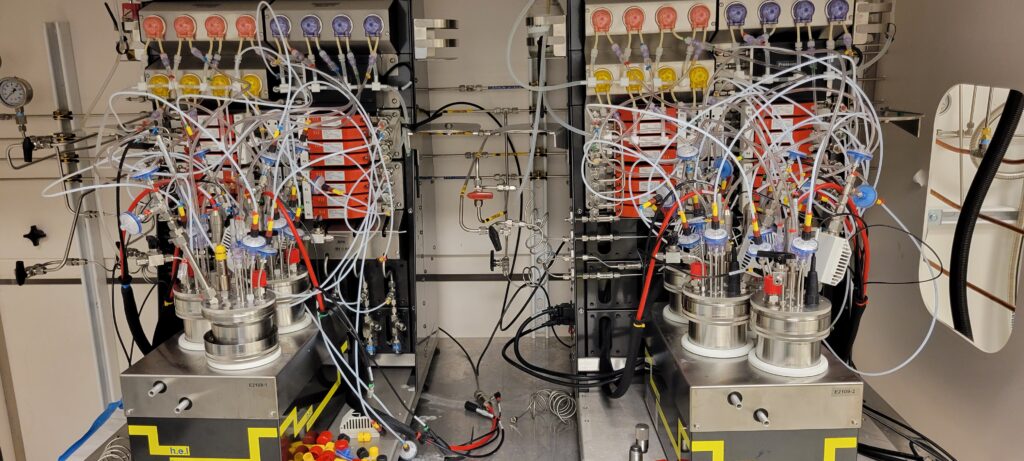
Gas fermentation, a process in which microorganisms convert waste gases into commodity chemicals, has the potential to inexpensively manufacture sustainable bio-based materials and fuels to help create a circular bioeconomy. In response to industry requests, ABPDU has purchased, installed, and commissioned gas fermentation equipment with internal Berkeley Lab funding. This capability now enables our industrial collaborators to pursue process development and scale-up projects involving the bioconversion of gaseous feedstocks.
The equipment includes eight 500ml pressurizable gas fermentors and a 20L bioreactor, as well as associated gas supply, gas analysis, and safety infrastructure.
“We received feedback from our industry collaborators, particularly at our Industry Listening Day in 2019, that they were interested in having access to a gas fermentation process development and scale-up capability,” said Eric Sundstrom, Staff Scientist and Principal Investigator at the ABPDU. “We’re excited to be able to offer this capability that aligns with several Department of Energy priorities, including biomass utilization, CO2 utilization, and generation of sustainable aviation fuels and sustainable materials.”
Effective delivery of flammable gas to fermentors presents significant challenges for conventional bioreactors. In order to ensure ABPDU was equipped for safe experimentation, staff completed safety approvals and developed best practices. The suite of pressurizable gas fermentors are each equipped for a customizable supply of carbon dioxide, hydrogen, methane, carbon monoxide, oxygen, and/or nitrogen.
These new capabilities have so far been leveraged to support two industry collaborations, including a collaboration between the Agile BioFoundry and Industrial Microbes aiming to achieve predictive scale-up of a process that uses microbes to convert ethane into 3-hydroxypropionic acid. The equipment has also been utilized in projects for the DOE Bioenergy Technologies Office’s BETO CO2 Reduction and Upgrading for e-Fuels Consortium. Additional collaborations are currently in development.
“After this year, we will have completed the first demonstrations of use of this equipment,” said Sara Tejedor Sanz, senior fermentation engineer at ABPDU. “I expect that in the coming years, use of these capabilities will continue to grow.”